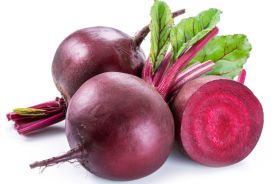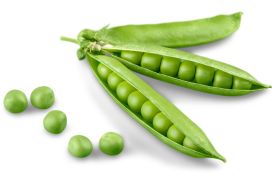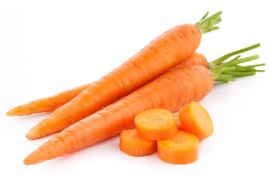Beets, scientifically known as Beta vulgaris, are a versatile and nutritious root vegetable widely cultivated for both culinary and nutritional purposes. Belonging to the Amaranthaceae family, beets come in various shapes and colors, with the most common being the deep red or purple variety. The vegetable is prized for its sweet and earthy flavor, making it a popular ingredient in a range of dishes.
The edible part of the beet plant is the bulbous root, which can be round, cylindrical, or elongated, depending on the variety. Besides the red or purple beets, there are also golden and white varieties, each offering a slightly different taste and appearance.
Culinarily, beets are incredibly versatile and can be enjoyed in numerous ways. They can be roasted, boiled, steamed, or eaten raw, and their sweet flavor pairs well with various ingredients. Beets are often featured in salads, soups, and side dishes, and they can even be used to make vibrant beet juice or incorporated into desserts.
Nutritionally, beets are a powerhouse of essential vitamins and minerals. They are particularly rich in folate, manganese, potassium, and vitamin C. Additionally, beets contain dietary fiber and antioxidants, contributing to their potential health benefits. Some studies suggest that regular consumption of beets may support heart health, help manage blood pressure, and enhance exercise performance.
Growing conditions for beets involve well-drained soil and adequate sunlight. The entire plant is edible, including the leaves, which are known as beet greens and can be cooked or used in salads.
Overall, beets stand out as a nutritious, flavorful, and visually appealing vegetable that adds both culinary and health benefits to a well-balanced diet.
The Organic Beets at Qurban Agro Farms
Qurban Agro Farms takes pride in its commitment to organic farming practices, and this dedication extends to the cultivation of beets. Specializing in the production of organic beets, the farm prioritizes sustainable and environmentally friendly methods. By avoiding synthetic pesticides, herbicides, and chemical fertilizers, Qurban Agro Farms ensures that its beets meet organic standards, providing consumers with a wholesome and eco-conscious choice. Through their organic beet cultivation, the farm aims to promote not only the health benefits of this vibrant root vegetable but also the principles of sustainable agriculture and environmental stewardship.
What are the health benefits of Beets?
Beets are a nutrient-rich vegetable that offers a range of potential health benefits. Here are some of the key advantages associated with the consumption of beets:
Rich in Nutrients:
– Beets are a good source of essential nutrients, including folate, manganese, potassium, and vitamin C. These nutrients play crucial roles in supporting overall health and well-being.
Heart Health:
– The nitrates in beets may contribute to heart health by helping to relax blood vessels, improving blood flow, and potentially lowering blood pressure. Regular consumption of beets has been associated with cardiovascular benefits.
Dietary Fiber Content:
– Beets contain dietary fiber, which promotes digestive health and can aid in maintaining a healthy weight. Fiber helps regulate bowel movements and supports the growth of beneficial gut bacteria.
Antioxidant Properties:
– Beets contain antioxidants, including betalains, which help combat oxidative stress in the body. Antioxidants play a role in neutralizing free radicals, potentially reducing the risk of chronic diseases.
Anti-Inflammatory Effects:
– The betalains in beets have been studied for their anti-inflammatory properties. Managing inflammation is important for overall health and may contribute to the prevention of certain chronic conditions.
Exercise Performance:
– Some research suggests that the nitrates in beets may enhance exercise performance by improving oxygen use and increasing endurance. Athletes and individuals engaged in physical activities may benefit from incorporating beets into their diet.
Supports Liver Health:
– Betaine, a compound found in beets, may support liver function by promoting the processing of fats. This can be beneficial for individuals with fatty liver disease.
Potential Cancer-Fighting Properties:
– Some studies indicate that the antioxidants in beets may have anti-cancer properties, particularly in relation to certain types of cancer. However, more research is needed to establish conclusive evidence.
Stabilizes Blood Sugar:
– The fiber content in beets, along with their low glycemic index, may contribute to stabilizing blood sugar levels. This can be particularly beneficial for individuals managing diabetes or insulin resistance.
It’s important to note that individual responses to dietary components can vary. While beets offer numerous health benefits, it’s advisable to incorporate them as part of a balanced and varied diet. As with any significant dietary changes, individuals with specific health concerns should consult with a healthcare professional for personalized advice.
How is our Organic Beets different from Conventional Beets?
The primary differences between organic beets and conventional (non-organic) beets lie in their cultivation methods, potential exposure to synthetic chemicals, and overall impact on the environment. Here are the key distinctions:
Cultivation Practices:
– Organic Beets: Organic beets are cultivated following strict organic farming standards. This means that the cultivation process avoids the use of synthetic pesticides, herbicides, and chemical fertilizers. Instead, organic farmers rely on natural alternatives, crop rotation, and other sustainable practices to manage pests and enhance soil fertility.
– Conventional Beets: Conventional farming practices may involve the use of synthetic pesticides, herbicides, and fertilizers to maximize yield and protect crops from pests and diseases. This approach aims to achieve efficient production but may contribute to concerns related to chemical residues in the final product.
Chemical Residues:
– Organic Beets: Because organic farming prohibits the use of synthetic chemicals, organic beets typically have lower levels of chemical residues. This makes them a preferred choice for individuals who want to minimize exposure to potentially harmful substances.
– Conventional Beets: Conventional beets may carry trace amounts of synthetic pesticides and fertilizers, although these levels are generally within regulatory limits. Washing and peeling conventionally grown beets can help reduce potential exposure to residues.
Soil Health:
– Organic Beets: Organic farming practices focus on maintaining soil health through methods such as crop rotation, cover cropping, and the use of organic matter. This approach promotes biodiversity and contributes to long-term soil fertility.
– Conventional Beets: The use of synthetic inputs in conventional farming may impact soil health over time, potentially leading to issues like soil degradation and a reduction in beneficial microorganisms.
Genetically Modified Organisms (GMOs):
– Organic Beets: Organic farming standards prohibit the use of genetically modified organisms (GMOs). Organic beets are non-GMO by definition.
– Conventional Beets: Some conventional beet varieties may be genetically modified, particularly for traits like resistance to pests or herbicides. Non-GMO conventional beets are also available.
Environmental Impact:
– Organic Beets: Organic farming practices generally prioritize environmental sustainability by avoiding synthetic chemicals and promoting biodiversity. This approach aims to minimize the ecological impact of agriculture.
– Conventional Beets: Conventional farming may have a higher environmental impact due to the use of synthetic inputs and potential runoff of chemicals into water systems.
In summary, the choice between organic and conventional beets often comes down to personal preferences regarding environmental concerns, potential chemical exposure, and support for specific farming practices. Organic beets are favored by those who prioritize sustainable and organic farming methods, while conventional beets are widely available and may be more cost-effective for some consumers.
FAQs
Q: How should I store beets to keep them fresh for a longer time?
– A: Trim the beet greens, leaving about an inch of the stems attached, and store beets in a perforated plastic bag in the refrigerator. This helps maintain their freshness and prevents moisture buildup.
Q: Can I eat beet greens, and are they as nutritious as the roots?
– A: Yes, beet greens are edible and highly nutritious. They are rich in vitamins, minerals, and antioxidants. They can be cooked or added raw to salads.
Q: Are there different varieties of beets, and do they taste different?
– A: Yes, there are various beet varieties, including red, golden, and white beets. While their taste is generally similar, some people find subtle flavor differences. Golden beets, for example, are often considered milder than red beets.
Q: How can I prevent my hands from staining while handling beets?
– A: To prevent beet stains on your hands, wear kitchen gloves while handling and preparing beets. If stains occur, rubbing hands with lemon juice or vinegar can help remove the discoloration.
Q: Can I eat beets raw, or do they need to be cooked?
– A: Yes, beets can be eaten raw. Grated or thinly sliced beets can be added to salads for a crunchy texture. However, cooking beets enhances their sweetness and makes them tender. Beets can be roasted, boiled, steamed, or even pickled based on personal preference.





There are no reviews yet.